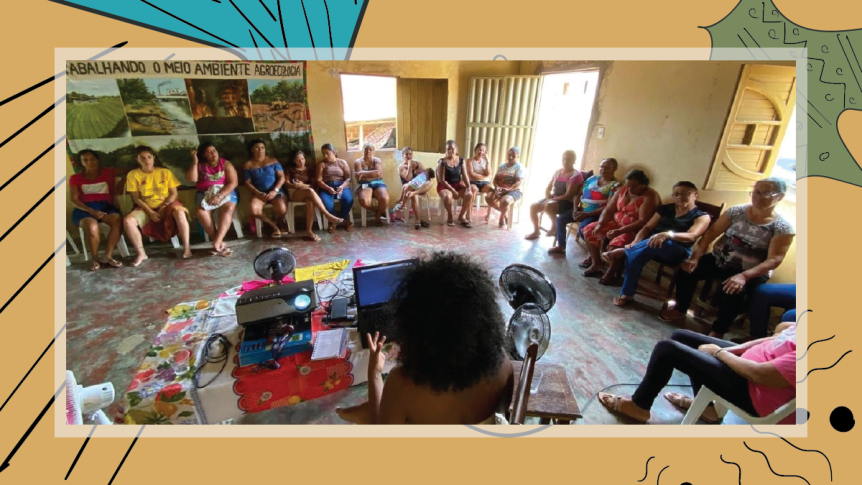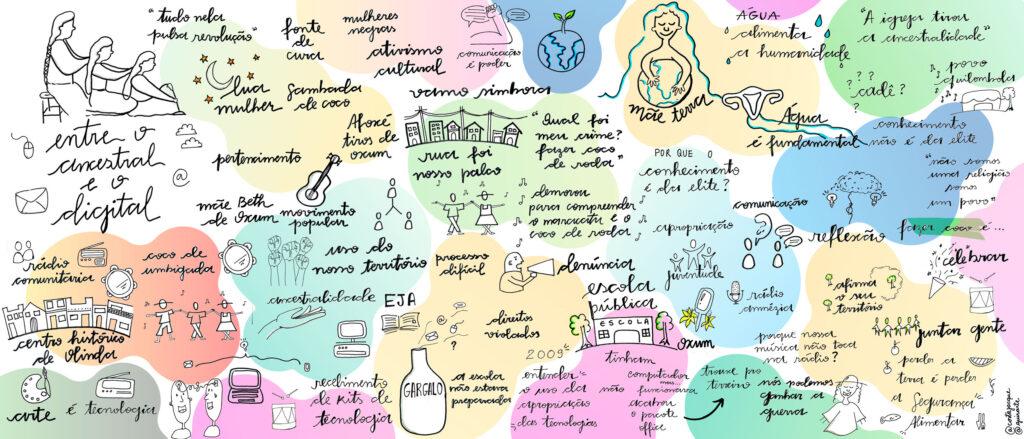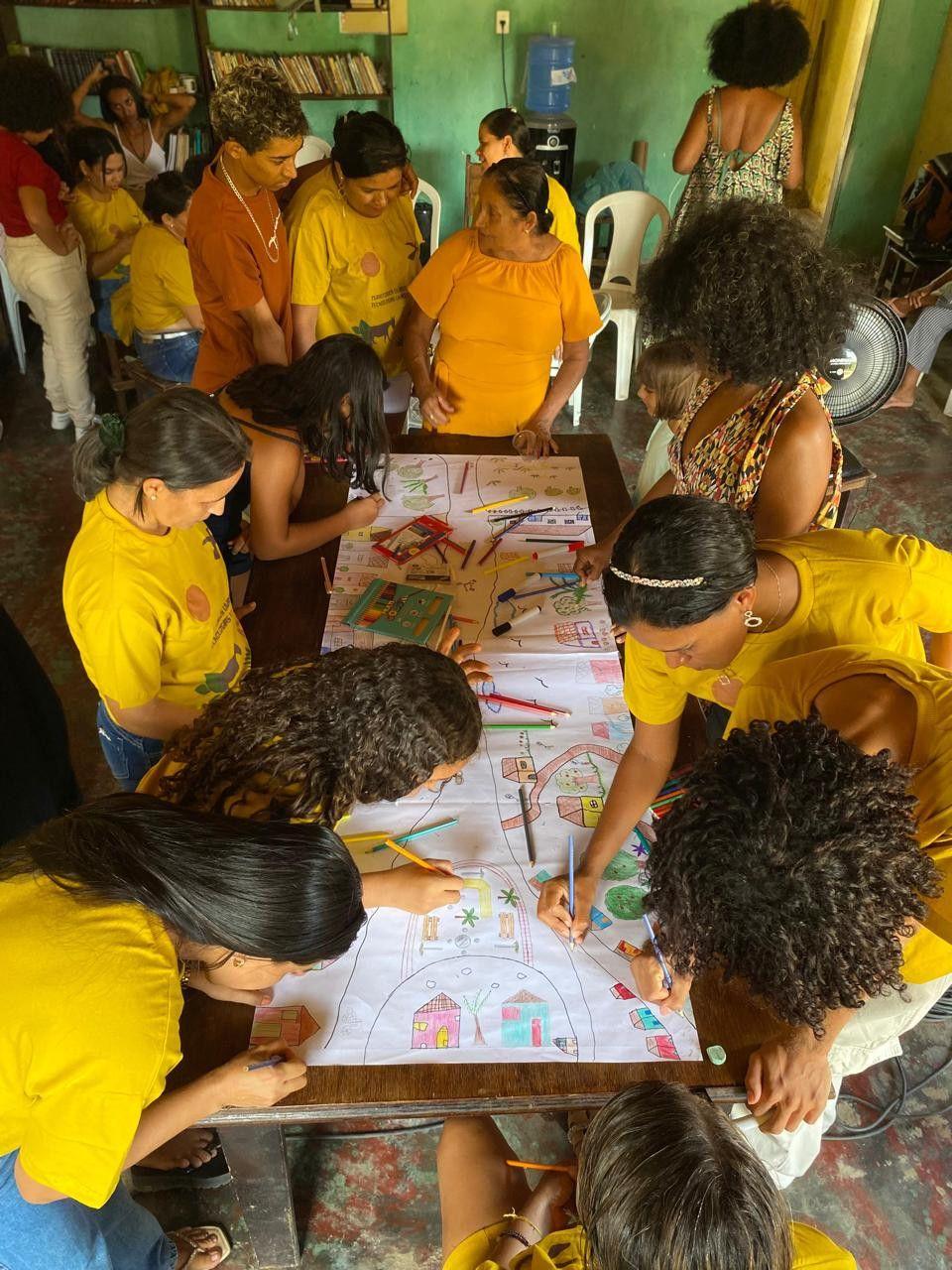
How can the internet and digital technologies help defend territorial autonomy while supporting women’s rights and socio-environmental justice? This is a key question for the Free Territories, Free Technologies project, being coordinated by Intervozes since 2020 and now entering a new phase of in-person activities across dozens of communities in Brazil.
Developed by Intervozes in partnership with Conaq – a national network representing quilombolas African-Brazilian communities – the Movement of Rural Women Workers of the Northeast (MMTR-NE in the Portuguese acronym), the project proposes a collective and participatory mapping of how several communities in Brazil’s Northeast access, use and understand the internet and information and communication technologies (ICTs). Launched during the COVID-19 pandemic in response to the global health crisis and the ongoing difficulties in accessing communication tools in some territories, this mapping involved 270 families across 33 territories in all nine states of the region. Built on lending an empathetic ear to the demands presented by the community itself, the project also delivered a series of online training sessions on the right to communication, in partnership with local movements.
Now in a new phase, the project is returning to the mapped communities to share and update the original data, while also identifying – together with them – the current impacts and challenges related to ICT access and exploring local solutions. With support from an APC’s subgrant, approved at the end of 2024, one of them held a two-day gathering in January 2025 to discuss how to tackle gender-based violence (GBV) and promote community networks as a connectivity alternative.
A history of alliances with communities at the centre
Since 2020, this project has been focusing on the right to communication, and access to the internet and ICTs for rural and traditional peoples and communities in Brazil’s Northeast region.

At the end of 2023, the initiative entered a new phase with the launch of a caravan to facilitate visiting these communities to discuss topics such as internet access and human rights. The caravan seeks to strengthen local advocacy skills and support the creation of community-led narratives that demand free and safe internet access, while respecting local autonomy and promoting gender equality and socio-environmental justice.
On 17 and 18 January, Intervozes held an on-site activity to discuss the impacts of ICTs and the internet on community life, especially observing the growing GBV in the digital world. This was a topic the women themselves proposed after mapping, alongside others in the community, the impacts of the internet’s arrival in their lives. Among the findings were positive outcomes – such as the exchange of information between women from different territories – but also negative consequences, including new forms of violence enabled by digital connectivity and the spread of online betting games, which have contributed to increasing poverty in the territories.
The on-site activity was formulated in partnership with Rafaela Leão, researcher and activist from the Rural Women Workers Movement of Alagoas (RWWM-AL), and with fisherwomen, rural workers, and the quilombolas from the communities of Bela Vista, Vista Alegre, and Ilha das Antas, located in Igreja Nova, in Alagoas, Northeast Brazil.
Alongside collective discussions, the women also began designing a community internet network led by rural women – aimed at strengthening digital autonomy and protecting local rights online. With technical support from Coolab, a cooperative that promotes autonomous communication infrastructures, participants collated information from their territory to create a technical and financial diagnosis on the feasibility of building this community network. This network will be built with the objective of improving the technological autonomy of these women and mitigating the violations of digital rights in the territory.
The two-day gathering also included workshops on data protection and digital security, led by Johanna Monagreda, from Data Privacy Brazil, and Tânia Silva, from Coolab, who introduced community networks an alternative to build safer and more inclusive connectivity models.
In total, 33 women participated, sharing their experiences and envisioning practical ways to improve access while resisting digital inequalities. Afterwards, the community drew a map of the entire territory and, based on it, reflected on the challenges and possible paths to implement their plans for the community network.

Weaving meaningful encounters
From Intervozes, we are proud to have structured the event with the women of the communities based on their needs and expectations. The entire process started from their demands, and the format and topics covered were developed together, right up to the finalisation and final guidelines. We highlight, as a very significant result, both for our organisation and the community, the fact that these women have rethought the use of the internet in the community, moving from an individualised concept to a more collective idea.
The collective mapping of internet use in the community was fundamental to this, building an ongoing process that has led to a broader awareness of the limits of internet security, which has led the community to imagine more collective and secure forms of use. We also believe and advocate that this is a very successful way of building solutions: listening to the communities most affected by the problems.
Looking forward, our goal is returning to all the communities involved in the mapping to share and update the data right from 2020 onwards and to identify, with the community, the impacts and challenges related to internet access and ICTs in the territories and formulate ways to mitigate the problems. As long-time partner of the project, APC continues to back efforts that centre connectivity as a right – and as a tool for social and environmental justice.
Find out more about the Free Territories, Free Technologies Project and learn more about its mapping and podcast at: https://territorioslivres.intervozes.org.br/
Jonaire Mendonça and Alfredo Portugal are members of Intervozes in the Bahia state.
The text was written with the collaboration of Iara Moura, also from Intervozes. Photos: Alfredo Portugal / Translation Carolina de Lima.
This piece was written by Intervozes as part of their APC's advocacy and institutional strengthening grants, adapted for the Seeding Change column. Did this story inspire you to plant seeds of change in your community? Share your story with us at communications@apc.org